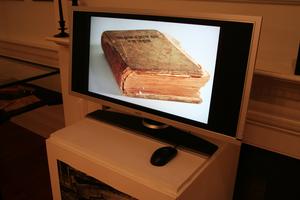

"History of Country Music in the Tri-Cities" interactive kiosk opened in Carroll Reece Museum at East Tennessee State University.
JOHNSON CITY, Tenn. -- "History of Country Music in the Tri-Cities," the first interactive kiosk of its kind in the region, opened to the public Tuesday, Nov. 6, in the Carroll Reece Museum at East Tennessee State University.
The kiosk and its accompanying exhibit draw upon both rare and rarely seen artifacts from the Reece Museum and the Archives of Appalachia.
Developed under the umbrella of ETSU's Center for Appalachian Studies and Services (CASS), a Tennessee Center of Excellence of which both the Museum and Archives are a part, the kiosk and exhibit are even more timely becausethis academic year marks a milestone in another of the Center's units -- the 25th anniversary of ETSU's Bluegrass, Old-Time and Country Music Program.
The kiosk was developed from a script first written in the 1980s by then-CASS Director Dr. Richard Blaustein and co-authored by Charles Wolfe. Grant funding for the original script came from the National Endowment for the Humanities.
Roy Andrade, an adjunct instructor in the Bluegrass, Old-Time and Country Music Program, was hired earlier this year to visually "bring that script to life" using current technology. With the help of Syndeo Alliance, L.L.C., a Johnson City Web strategy and creative solutions agency, the resulting kiosk traces the region's country music history from the early 20th century through the 1940s.
"History of Country Music in the Tri-Cities" represents the first developmental phase of this interactive kiosk. According to Theresa Burchett, Reece Museum director, "The kiosk is a great start toward making the Reece more available to a broader audience. To keep visitors coming and to keep them engaged, it is important to present material using the technology of the day."
This phase of the kiosk's development was made possible with support from the Tennessee Film, Entertainment and Music Commission, the Tennessee Higher Education Commission, and ETSU.
Reece Museum hours are 9 a.m.-4 p.m. Tuesday, Wednesday and Friday, and 9 a.m.-7 p.m. Thursday. For more information or for special assistance for those with disabilities, call 423-439-4392.